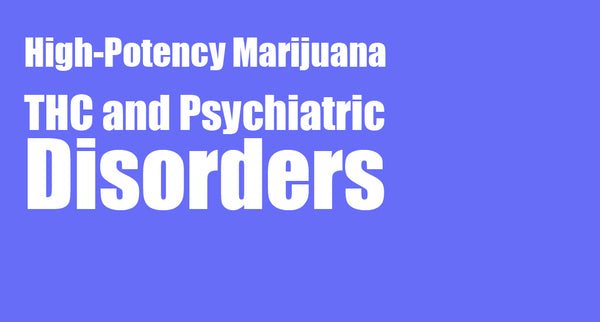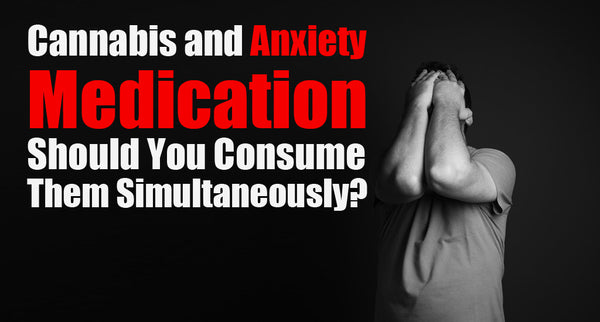
Marijuana & Depression: The Role of The Endocannabinoid System in Mood Health
With the growing popularity and widespread use of cannabis for both medicinal and recreational purposes, research into CBD and the Endocannabinoid System has emerged as a significant area in the health field.
This surge in interest is well-justified, given the numerous potential benefits associated with these topics.
Physiological effects of Marijuana in the body
CBD, or Cannabidiol, is a phytocannabinoid that, along with THC (the psychoactive constituent in marijuana), plays a significant role in the cannabis plant. Phytocannabinoids, which are cannabinoids derived from plants, mimic many actions of our body's own endocannabinoids, aiding in achieving homeostasis.
These phytocannabinoids, including CBD and THC, interact with the body's natural cannabinoid receptors (CB1 and CB2), stimulating responses that promote balance. CB1 receptors are primarily found in the central nervous system, while CB2 receptors are mainly located in the immune system and peripheral tissues. By binding to these receptors, CBD and THC can influence various physiological functions and modulate the body's responses.
Related article: THC and CBD, and the Entourage Effect!
The interaction between CBD, THC, and cannabinoid receptors is complex, influencing different systems in the body. These interactions can have effects such as pain relief, inflammation reduction, mood and emotion regulation, sleep improvement, and immune function support. The study of CBD and the Endocannabinoid System offers insights into how these compounds could be used for health and well-being.
In addition to plant-derived cannabinoids, our bodies produce endocannabinoids like Anandamide (AEA) and 2-Arachidonylglycerol (2-AG), crucial for activating cannabinoid receptors and maintaining balance. Endocannabinoids are endogenous lipids synthesized in response to physiological cues. They act as signaling molecules, binding to cannabinoid receptors, particularly CB1 and CB2, initiating biochemical reactions that regulate pain, mood, appetite, immune response, and inflammation.
Anandamide, known as the "bliss molecule," is involved in mood regulation, pain management, and promoting well-being. 2-AG is vital for immune function, neuroprotection, and cardiovascular health. These endocannabinoids help maintain the body's internal balance, or homeostasis.
The discovery of endocannabinoids and their role in the endocannabinoid system has opened new research avenues and potential therapeutic applications. Targeting this system could lead to interventions that utilize the body's natural health-promoting mechanisms.
Our Body’s Natural Cannabinoid Receptors
-
Cannabinoid 1 (CB1) Receptors are primarily found in the brain and nervous system, as well as in the liver, lungs, and kidneys. Our natural endocannabinoid, Anandamide (AEA), along with consumed cannabinoids, mainly bind with these CB1 receptors. This binding offers relief from various symptoms such as pain, inflammation, and depression, among others.
-
Cannabinoid 2 (CB2) Receptors are predominantly located in the immune system, gastrointestinal tract, and spleen. CB2 receptors bind most effectively with 2-Arachidonylglycerol (2-AG). Our natural endocannabinoids, in addition to consumed cannabinoids, primarily interact with these CB2 receptors. This interaction provides relief from inflammation and pain, and plays a role in regulating our immune system.
The Uplifting Effects of Marijuana
Exploring the implications of the Endocannabinoid System on mood health is a growing area of interest. Many individuals use cannabinoids for their potential to uplift mood. Emerging research suggests that these effects could be linked to the balance of the body's Endocannabinoid System.
Recent studies have indicated that cannabinoids like CBD may have antidepressant and anti-anxiety properties. These effects are thought to arise from promoting balance within the Endocannabinoid System. This system is a complex network involved in regulating various physiological processes, including mood and emotions. Therefore, it's hypothesized that deficiencies in endocannabinoids within this natural body system may contribute to conditions like depression and anxiety.
Related article: Marijuana and Anxiety - Tips and Tricks To Overcome Your Paranoia While You're High
Medication Interactions with Cannabis
Tricyclic antidepressants (TCAs) and Monoamine Oxidase Inhibitors (MAOIs) have been associated with potential adverse interactions when used with marijuana. These interactions can lead to severe side effects such as tachycardia, extreme restlessness, confusion, mood swings, hallucinations, and in some cases, life-threatening conditions. It's important for individuals using TCAs or MAOIs to exercise caution and consult their healthcare provider before considering marijuana use.
On the other hand, Selective Serotonin Reuptake Inhibitors (SSRIs) and Serotonin-Norepinephrine Reuptake Inhibitors (SNRIs) have been associated with low to moderate risks when used with marijuana. These commonly prescribed antidepressants have fewer reported adverse interactions with cannabis. However, individual responses may vary, and the interactions between these medications and marijuana are not fully understood.
It is crucial for individuals using SSRIs or SNRIs and considering or currently using marijuana to discuss this with their healthcare provider. They can provide personalized guidance, including potential risks, benefits, and any drug interactions that may arise. Open communication with healthcare providers is essential to ensure the safest and most effective treatment plan for mental health needs, especially considering the potential for antidepressants to be less effective or take longer to work, and the heightened risk of transitioning from moderate to problematic cannabis use in individuals experiencing depression.
4 natural ways of combating Depression?
Approaching depression with a comprehensive treatment plan is essential. If you are experiencing persistent mood concerns or anxiety, seeking guidance from a healthcare professional is advisable. They can offer personalized advice and support. Developing a holistic approach that includes nutrition and lifestyle factors, alongside any necessary medical interventions, is crucial for optimizing mental well-being.
Evidence supports the significant role of lifestyle factors in depressive disorders, with interventions to modify these habits proving beneficial in both the protection and treatment of depression. Optimizing nutrition can help prevent and alleviate depression symptoms, as diet plays a crucial role in emotional well-being and in the prevention and treatment of behavioral health disorders.
First: Quality food
Consuming whole, nutrient-dense foods, particularly those rich in B vitamins and antioxidants, can positively impact mood regulation and anxiety management. Proper nutrition is crucial in supporting overall mental health and well-being.
B vitamins, such as B6, B9 (folate), and B12, are essential for producing and regulating neurotransmitters involved in mood regulation, like serotonin and dopamine. Including foods like leafy greens, legumes, whole grains, nuts, and seeds in your diet can help ensure adequate intake of these B vitamins. Studies suggest a higher intake of dietary B vitamins is associated with a lower prevalence of depression, anxiety, and stress symptoms.
Antioxidants, found in fruits, vegetables, and other plant-based foods, help protect cells from oxidative stress and inflammation. Research indicates that oxidative stress may contribute to mood disorders, including anxiety and depression. By consuming a variety of colorful fruits and vegetables, you can provide your body with a range of antioxidants that support mental well-being. Depression is linked to lower intake of antioxidants and B vitamins, and higher intake of these nutrients may reduce the occurrence and severity of depression.
Incorporating a well-balanced diet that includes lean proteins, whole grains, fruits, vegetables, and healthy fats provides the necessary nutrients to support mood regulation and reduce anxiety. It's also important to stay hydrated and limit processed foods, refined sugars, and excessive caffeine, as they can negatively affect mood and overall health.
Second: Sleep
Obtaining sufficient sleep is crucial for restoring our body and mind, and it plays a significant role in maintaining healthy gastrointestinal (GI) functioning, which in turn has a profound effect on our mood. Research increasingly highlights the influence of our gut on our mental and overall health, surpassing previous understandings. Indeed, nearly 90% of serotonin, a neurotransmitter associated with feelings of well-being, is found in our gut.
Several factors, including good sleep quality, adequate hydration, proper nutrition, regular exercise, and stress management, can positively impact GI functioning. For sleep, establishing a consistent schedule, creating a comfortable environment, and practicing relaxation techniques before bed can promote better quality sleep. Prioritizing hydration supports healthy digestion and overall GI health.
Nutrition plays a vital role in supporting a healthy gut. A balanced diet rich in fiber, probiotics (found in fermented foods like yogurt, sauerkraut, and kimchi), and prebiotics (found in foods like bananas, onions, and garlic) nurtures a diverse and beneficial gut microbiome, influencing mental health.
Regular exercise positively impacts gut health and promotes a healthy microbiome. Physical activity improves GI motility, reduces stress, and enhances overall well-being.
Effectively managing stress is crucial for a healthy gut and mental well-being. Chronic stress can disrupt the gut microbiome and affect GI functioning. Activities like mindfulness meditation, deep breathing exercises, or engaging in enjoyable hobbies can support a healthier gut and mood. The gut-brain connection is a two-way relationship where mental states can influence gut health and vice versa.
Third: Getting outdoors is also significant
Research suggests that adequate levels of Vitamin D, primarily obtained through sunlight exposure, may contribute to the improvement of depressive symptoms. Vitamin D plays a vital role in various physiological processes, including brain function and mood regulation.
Sunlight is the primary source of Vitamin D, as our bodies synthesize it when exposed to sunlight. However, it's important to balance sun exposure and protect the skin from potential harm. Studies have found associations between Vitamin D deficiency and an increased risk of depressive symptoms and mood disorders. Vitamin D receptors in the brain, involved in mood regulation, and Vitamin D's role in serotonin synthesis, a neurotransmitter key to mood regulation, underline its importance.
Supplementing with Vitamin D, particularly in individuals with low levels or limited sunlight exposure, may be beneficial for improving depressive symptoms. However, consulting a healthcare professional for appropriate dosage and alignment with individual needs is crucial. While Vitamin D supplementation can be helpful, it is not a standalone solution for treating depression or other mood disorders. Mental health conditions require a comprehensive approach, including professional guidance, therapy, lifestyle modifications, and sometimes medication.
Forth: Exercise
Regular exercise indeed has profound implications for our mood and mental well-being. Research supports that the benefits of exercise can be comparable to those of antidepressant medications in alleviating symptoms of depression, anxiety, and ADHD. Exercise not only relieves stress and improves memory but also helps in better sleep and overall mood enhancement. Importantly, modest amounts of exercise are sufficient to make a significant difference.
The phenomenon known as "Runner's High," characterized by feelings of euphoria and well-being after prolonged cardio exercise, is an interesting aspect of exercise's effect on mood. Emerging research indicates that this sensation may be associated with the release of endocannabinoids, specifically Anandamide (AEA), which interact with the brain's reward centers. Anandamide is known for its role in regulating anxiety and depression. During exercise, increased levels of Anandamide are hypothesized to be responsible for mood-enhancing effects, acting as a signaling molecule that binds to cannabinoid receptors in the brain.
The interaction between Anandamide and the brain's reward centers suggests that exercise-induced increases in Anandamide levels may contribute to improved mood and feelings of well-being. While the specific mechanisms underlying the relationship between exercise, endocannabinoids, and mood are still being explored, the evidence points towards a positive correlation. Regular exercise, including cardiovascular, strength training, or other physical activities, offers various mental health benefits, such as the release of endorphins, a sense of accomplishment, distraction from negative thoughts, and opportunities for social interaction, all contributing to improved mood and reduced symptoms of anxiety and depression.
Harnessing the Potential of Cannabis to Combat Depression and Optimize Mood
Less is More. Adopting a micro-dosing approach when using cannabis for mood enhancement and minimizing depressive symptoms is important. Microdosing involves consuming minimal amounts of cannabis to optimize its desired effects without overindulgence. This approach allows for the avoidance of potential depressant effects that may arise from excessive consumption, especially important for individuals already dealing with depressive symptoms. Research suggests that low doses of THC, a component of cannabis, can improve mood and reduce symptoms of depression by activating the endocannabinoid system, which regulates mood, appetite, and sleep. However, responses to cannabis vary, with some individuals experiencing increased feelings of drowsiness, anxiety, or paranoia.
Incorporating enjoyable activities while microdosing can further enhance its positive effects. Listening to music, going for a walk, reading an enjoyable book, or watching a funny movie can amplify the mood-boosting effects of cannabis. Laughter, in particular, can serve as an excellent complement to cannabis in mood regulation.
Creating a comfortable and uplifting atmosphere is also key to optimizing the benefits of cannabis microdosing. Activities like spending time outdoors, which is beneficial for well-being, and being in the company of supportive and positive people, can enhance the overall experience. Microdosing cannabis can offer a gentle boost to mood and overall emotional well-being without the risk of emotional instability that can occur with higher doses.
Other things to try?
-
Grounding/Earthing involves direct contact with the Earth's surface (like walking barefoot) and is believed to have health benefits, including mood enhancement and healing properties. This technique is thought to balance and optimize body systems by absorbing free electrons from the Earth. However, the scientific research on grounding is still limited, and more studies are needed to fully understand its health implications.
-
Deep Breathing, Meditation, Yoga, and Self-Care are all practices that have been shown to have profound effects on mood and overall health. Deep breathing is a simple yet powerful relaxation technique that helps to manage stress levels. Yoga combines physical movement, deep breathing, meditation, and mindfulness, contributing to improved mental health, reduced anxiety and depression, increased flexibility, and better brain health. Meditation has been clinically proven to be effective in managing stress, anxiety, pain, depression, insomnia, and high blood pressure.
-
Creativity through Drawing, Painting, Sketching, or Journaling/Writing can also be beneficial, particularly after consuming cannabis. Engaging in these activities can enhance self-expression and exploration, which may help reduce depressive symptoms and foster self-appreciation.
Research in this realm of health is emerging, and will continue to emerge; having important implications to our quality of life and well-being, as well as offering relief to those suffering from Depression.
Related article: 7 Tips for first time smoking weed, how to inhale, and more



